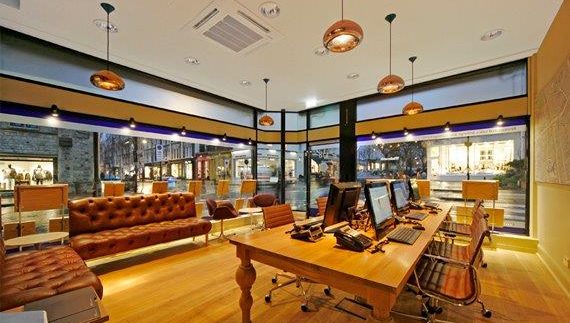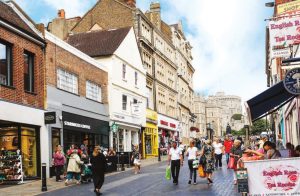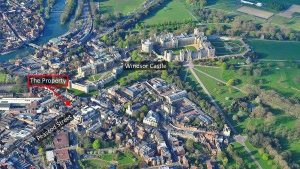Radical changes to Town Planning Law announced

Prime Minister Johnson has announced the most radical reforms to our planning system since the Second World War.
Under the new rules which became lawful in September, existing commercial properties, including newly vacant shops, can be converted into residential housing more easily, in a move to kick start the construction industry and speed up rebuilding.
The changes include:
- More types of commercial premises having total flexibility to be repurposed through reform of the Use Classes Order. A building used for retail, for instance, is able to be permanently used as a café or office without requiring a planning application and local authority approval. Pubs, libraries, village shops and other types of uses essential to the lifeblood of communities will not be covered by these flexibilities.
- A wider range of commercial buildings are allowed to change to residential use without the need for a planning application.
- Builders no longer need a normal planning application to demolish and rebuild vacant and redundant residential and commercial buildings if they are rebuilt as homes.
- Property owners will be able to build additional space above their properties via a fast track approval process, subject to neighbour consultation.


Most of these changes came into effect 1st September through changes to the law, supporting the High Street revival by allowing empty commercial properties to be quickly repurposed and reduce the pressure to build on green field land by making brownfield development easier. Developers will still need to adhere to high standards and regulations, just without the unnecessary red tape.
The Prime Minister also announced that work will begin to look at how land owned by the government can be managed more effectively.
Ahead of the Spending Review, a new, ambitious cross-government strategy will look at how public sector land can be managed and released so it can be put to better use. This would include home building, improving the environment, contributing to net zero goals and injecting growth opportunities into communities across the country.
These announcements come alongside a package of measures to support home building across England. These include:
- A £12bn affordable homes programme that will support up to 180,000 new affordable homes for ownership and rent over the next 8 years, confirmed today.
- Included in the affordable homes programme will be a 1,500 unit pilot of ‘First Homes’: houses that will be sold to first time buyers at a 30% discount which will remain in perpetuity, keeping them affordable for generations of families to own.
- Funds from the £400m Brownfield Land Fund have today been allocated to the West Midlands, Greater Manchester, West Yorkshire, Liverpool City Region, Sheffield City Region, and North of Tyne and Tees Valley to support around 24,000 homes.
- The Home Building Fund to help smaller developers access finance for new housing developments will receive additional £450m boost. This is expected to support delivery of around 7,200 new homes.
In a huge step towards comprehensive reform of England’s seven-decade old planning system, to introduce a new approach that works better for a modern economy and society some of the immediate changes and new terminology for commercial property use classes are as follows for guidance:
The Town and Country Planning (Use Classes) (Amendment) (England) Regulations 2020 (“UCO”) streamlines the existing 16 Use Classes into 11 by introducing three new broad Use Classes.
This means from 1 September 2020 planning permission is not be required for change of use within the new broader Use Classes unless explicitly stated, making it easier for businesses and landlords to adapt to the changing demands of the high street (there are exceptions for Flood Risk Areas, Conservation Areas and Grade Listed buildings)
Furthermore, the new Use Classes Order (UCO) also introduces the notion of a “part use”, allowing a change of use of part of a building, use or planning unit to an alternative Class E use without permission.
- Class E -A new single Commercial, Business and Service Use Class known as E which, as well as subsuming the existing A1, A2, A3, B1 and selected D1 and D2 Use Classes which includes retail, food, financial services, indoor sport and fitness, medical or health services, nurseries, offices and light industry, Class E will also include a new category of ‘other services which it is appropriate to provide in a commercial, business or service locality’. This is expected to comprise uses such as travel agents and post offices which were previously classified within Class A1.
- Class F1 – A new Learning and Non-Residential Institutions Use Class, known as F1, embraces the remaining parts of the existing D1 Use Classes that are not included within the new Class E. This will include education, non-commercial galleries, law courts, libraries, museums, places of worship and public halls.
- Class F2 – A new Local Community Use Class, known as F2, will comprises part of the current A1 and D2 Use Classes and includes small corner shops, local community halls, outdoor recreational areas and swimming pools.
- Sui Generis – Pubs, wine bars and other drinking establishments, drinking establishments with expanded food provision , hot food takeaways, live music venues, cinemas, concerts, bingo and dance halls are added to the list of sui generis uses so a change from one to another would require planning permission if there is a material change in use. There are significant potential uncertainties with this, for example, what the difference between a restaurant and a ‘drinking establishment with expanded food provision’ such as a gastropub might be. Consequently there could be a rise in disputes over such matters.
- Other Use Classes – Use Classes C (residential), B2 (general industrial) and B8 (storage and distribution) remain unchanged in all material respects.
Transitional provisions will ensure buildings or uses will continue to be subject to any existing Permitted Development (PD) rights in force on or before 31 August 2020. These provisions will remain in place until 31 July 2021 when revised PD rights will be introduced. The changes subsequently come into force on 1 September 2020 although there is a material period from 1 September 2020 to 31 July 2021, during which time references to uses and use classes in the General Permitted Development Order will remain as presently defined in the current UCO. This will allow a transition period where applications for prior approvals in the material period under existing PD rights will be assessed against the current UCO.
For live applications for planning permission submitted before 1 September 2020 which refer to uses or use classes in the current UCO, they must be determined by reference to the old use classes. Once implemented, nevertheless, in the absence of controls in the permission such uses may fall within the new classes for the purposes of the revised UCO.
From 1 September 2020 applications will be capable of seeking permissions that specify the new classes within the revised UCO.
If you are interested or affected by the rapidly changing face of Town Planning do contact us for further information general guidance and advice.


